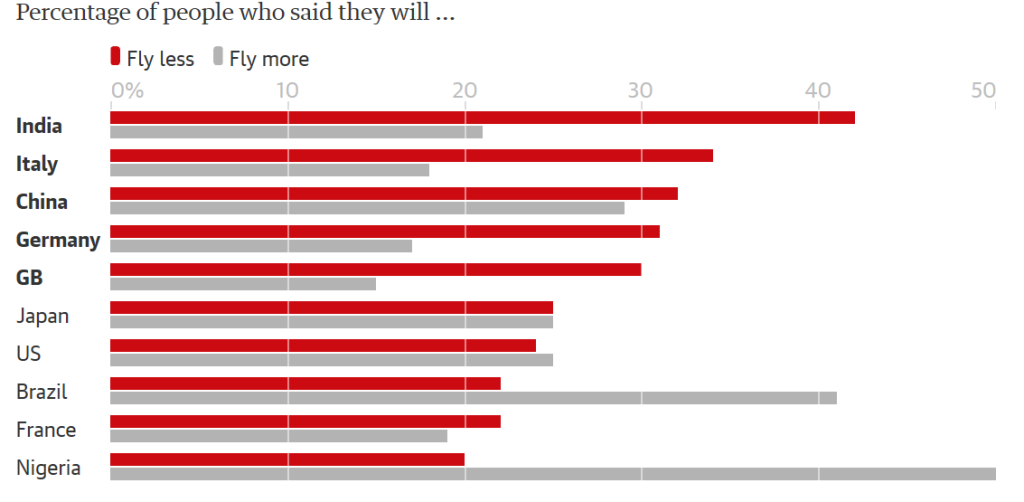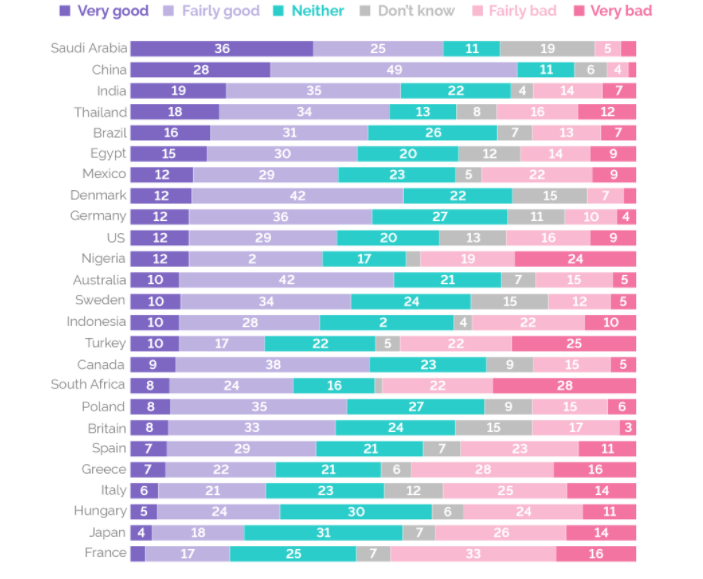The coronavirus pandemic has seen parts of the world quickly shut down, industrial activity cease, flights grounded and populations urged to stay indoors. This has given us a clear insight into how behaviours have been influencing the environment in which we live as greenhouse gas emissions and air pollution levels around the world dramatically decreased.
Before the pandemic the topic that everyone was talking about was sustainability and how the travel industry can and must play its part in helping to slow climate change and readdress the balance. Airlines, airports, aircraft manufacturers and hotels all had the issue front and centre of their agenda with a number of different initiatives taking place.
Latest research now highlights that we are now more understanding to how our own actions impact the environment. The second year of the YouGov-Cambridge Globalism Project, a tracking study of international attitudes across 25 of the world's largest countries, produced by YouGov in partnership with researchers from the Guardian, Cambridge University and the Tony Blair Institute for Global Change shows that by a ratio of more than three to one, the respondents agreed humankind was mainly or partly to blame for the climate emergency.
The research has a major focus on how the pandemic is impacting attitudes to global society, and the role of technology in transforming government for the 21st Century. It is captured from approximately 26,000 people across 25 countries, who were polled in Jul-2020 and Aug-2020.
This widespread acknowledgement of the science "is likely to strengthen calls for more ambitious international efforts to reduce industrial and agricultural emissions of carbon dioxide and other greenhouse gases that are intensifying global heating and extreme weather events, such as storms, floods and droughts," acknowledges the Guardian newspaper, which helped design the survey questioning.
Among the countries with the strongest support for this scientifically proven view were the UK (86%), China (87%), Japan (85%), Brazil (88%) and Spain (87%). The weakest were all oil states, though even in these countries - which rely heavily on fossil fuel sales - a substantial majority recognised humanity's role in climate disruption. Saudi Arabia was bottom with 57%, then Egypt with 67% and the US with 69%.

When it comes to behavioural change, there is far greater variations from country to country. Climate campaigners have called for a reduction in air travel, a big source of emissions, as the reduction in travel this year has highlighted. The report indicates that in several countries, the number of people who now plan to use planes less is higher than the number who said they would use them more, albeit coronavirus impacts such as travel fear may have influenced the results.
The Guardian's analysis of the results shows this trend was most marked in the UK (30% fly less versus 15% more), Italy (34% less versus 18% more), Germany (31% less versus 17% more) and India (42% less versus 21% more). However, in many other countries, the reverse was true, particularly Brazil (22% fly less versus 41% more) and Nigeria (20% less versus 50% more). In the US, China, France and Japan, there was little difference between the two.

But COVID-19 could leave a negative environmental legacy. A trend to road travel influenced by difficulties of adequate social spacing on public transport, could see more traffic, more congestion and more emissions. The Guardian analysis shows a widespread intention to drive more after the pandemic than before. This trend was apparent in all 26 countries in the survey and most pronounced in Brazil, where 62% said they would use their car more than before the pandemic, while only 12% said less, and South Africa 60% more and 12%. In the US and Australia, more than 40% expected to drive more than before, compared with 10% less.
Furthermore, this study provides in-depth consideration to how the interconnectedness of modern life has played a role in help to spread coronavirus and shows a striking level of stability in public commitment to globalism.
The rise of modern populism has been accompanied by a proliferation of sweeping theories on the public state of globalisation, which often reduce it to notions of a fundamental clash between progressive defenders of an open world versus illiberal advocates of a closed one. This kind of generalisation is challenged by the findings for the study, which shows attitudes to global engagement are typically nuanced across the political spectrum, rather than polarised.
